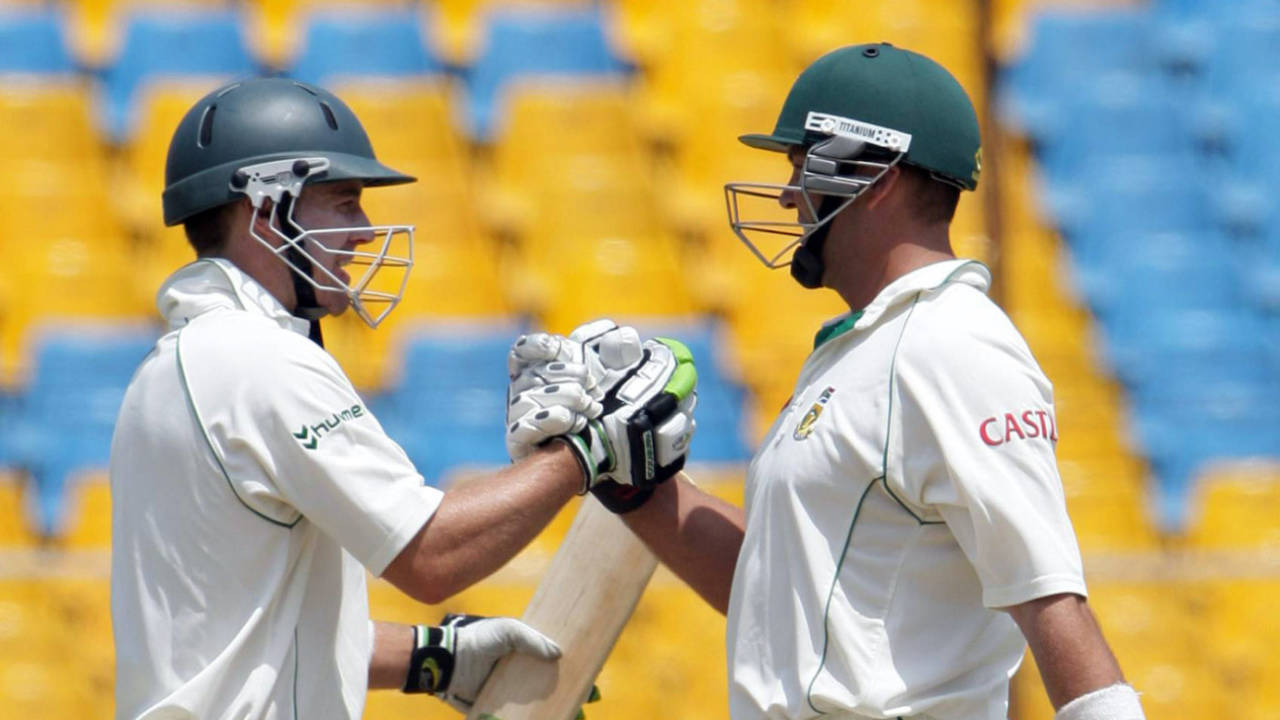Has anyone bagged a pair and sent down more wicketless overs than Jasprit Bumrah in the WTC final?
Also: has any player been out for 99 in their last Test?
Jacques Kallis and AB de Villiers have both scored hundreds in eight Test innings together • Getty Images
The answer here is quite intriguing, as the same man features in the top three pairs in the table. The prolific South African Jacques Kallis scored hundreds in eight innings in which AB de Villiers also reached three figures, while he scored seven in the same innings as both Hashim Amla and Graeme Smith. Kallis played 83 Tests alongside de Villiers, 68 with Amla and 106 with Smith.
Poor Jasprit Bumrah endured a barren time in the WTC final against New Zealand at the Ageas Bowl: apart from his pair, he sent down 36.4 overs without picking up a wicket (he did take a catch though). It still left him with a pretty good record overall - 83 wickets at 23.21 from 20 matches so far.
The Sri Lankan batter Charith Asalanka made his one-day international debut against England at Chester-le-Street last week on his 24th birthday, but was caught at slip off David Willey before he'd scored. In all, 22 batters have been dismissed for nought in an ODI on their birthday, but the only other one to suffer this fate in his first match was the Pakistan left-hander Asif Mujtaba, against West Indies in Gujranwala in 1986-87.

The only man to be dismissed for 99 in what turned out to be his final Test match was the adhesive South African batter Bruce Mitchell, who was caught behind off England's Alec Bedser after six and a half hours in Port Elizabeth in 1948-49.
There are two men known to have conceded 17 runs in their first over in Test cricket. One of them is rather a surprise - it's Jimmy Anderson, with an expensive start against Zimbabwe at Lord's in 2003, featuring three fours and a three from Dion Ebrahim, and two no-balls (fear not: he soon regrouped, and finished with 5 for 73). The other was the West Indian fast bowler Patterson Thompson, against New Zealand in Bridgetown in 1995-96; Nathan Astle hit four fours, and there was also a no-ball that wasn't scored from (Thompson overstepped 31 times in the match).
"Concerning your interesting assessment of Tests that went into a sixth day, there's a technical point about the World Test Championship final. In a special regulation just for this game, the ICC's playing conditions stated that 'The match shall be of five days' scheduled duration, with a reserve day available in order to make up lost playing time.' The idea was not really to provide an extra day to improve the chances of a result, but to ensure the full ration of around 450 overs was delivered (if by the end of the fifth day the total had been, say, 30 overs short, the sixth day would have comprised only those 30 overs). And if no play at all had been lost to the weather, the match would have ended in five days, with or without a positive result - a draw would have meant the trophy was shared. This being England, of course, quite a lot of play was lost, including the whole of the first day. That meant the reserve day was bound to be triggered, so pretty soon - and certainly by the time the match actually started - it was definitely heading for a sixth day (unless a result was achieved before that), which meant it was generally described as a six-day game."
Steven Lynch is the editor of the updated edition of Wisden on the Ashes
